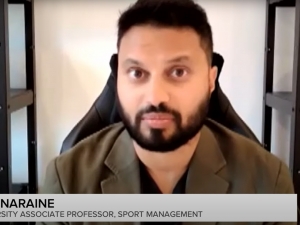A free talk about how we get our future selves to remember tasks will take place virtually Tuesday, Nov. 24 at 12:30 p.m. — but will you remember to sign up?
The Lifespan Development Research Institute is hosting, “What is prospective memory: Understanding how we remember to do things in the future,” a talk by Caitlin Mahy, Associate Professor in the Department of Psychology and Director of the Developing Memory and Cognition Lab at Brock.
Mahy, who has published extensively in the area of prospective memory, says she plans to offer a broad overview of the topic with a focus on the two groups who experience the biggest changes to their prospective memory abilities — young children and older adults.
“Prospective memory, or the ability to remember to carry out a future intention, is a critical cognitive ability that allows us to function independently and successfully complete tasks we intended to do,” says Mahy.
And yet, in spite of its importance in our lives, many people misunderstand prospective memory or make incorrect assumptions about how it should work.
“I am looking forward to challenging some of the misconceptions that exist — for example, that older adults are more forgetful than young adults in all settings, or that children’s forgetfulness is driven by bad behaviour and that nagging children will help,” she says.
Many factors affect our skills in prospective memory, Mahy says, including our ability to focus and our level of distraction. During a global pandemic, with many people under both acute and prolonged stress, individuals might also experience lapses in their abilities to remember.
“We know that stress can negatively impact memory and cognition, and prospective memory is no different,” she says. “Distraction plays a huge role in failing to carry out future intentions — there is work showing the important role of attention and executive function in prospective memory to support this idea.”
Mahy notes, however, that the research on stress and prospective memory shows varying results. While some kinds of short-term stress can heighten prospective memory abilities, other types, such as post-traumatic stress, can interfere.
Importantly, though, there is evidence that there are best practices when it comes to helping children build prospective memory and also when trying to develop and maintain our own skills.
“From a parenting perspective, there are some reminders that work better than others, so in the talk, I will review research on the use of visual and verbal reminders,” says Mahy. “For older adults, there is evidence that they actually perform better in their everyday settings and this might be due to greater use of reminders and higher motivation to do well compared to younger adults.”
Mahy also wants to remind the community that anyone interested in participating in future studies can sign up for the Growing With Brock database. Research studies are critical to helping her and her colleagues collect the data needed to learn more about how our minds work.
“What is prospective memory: Understanding how we remember to do things in the future” is free and open to the public but requires advance registration on the Lifespan website here.









